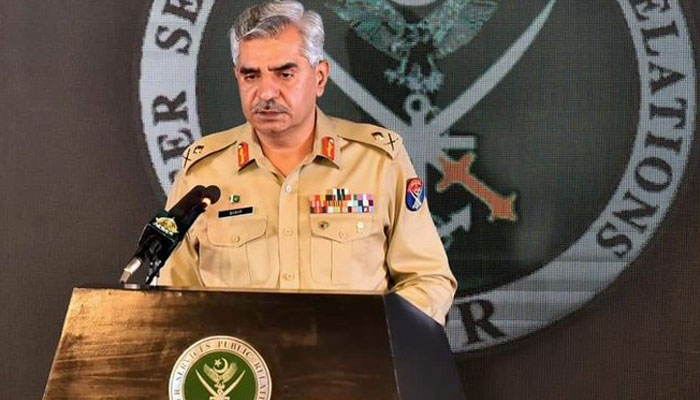Army target of propaganda: ISPR chief
The DG ISPR said it was the round-the-clock task of intelligence agencies to be aware of nefarious designs of enemies against the country and foil them
RAWALPINDI: The Inter-Services Public Relations (ISPR) Director General, Major General Babar Iftikhar, Tuesday once again rejected the narrative of 'conspiracy' in cipher from the US and said intelligence officials had categorically informed the National Security Committee (NSC) meeting that there was no evidence of any conspiracy.
In an interview to a news channel, Major General Babar Iftikhar said, “I say this with clarity that the Chairman Joint Chiefs of Staff Committee (CCJCSC), the three services chiefs, ISI Director General and other participants, who were present in the NSC meeting, were informed categorically in detail by the agencies that there was no evidence of any conspiracy and no such thing happened.”
He said the meeting was also informed that it was the round-the-clock task of intelligence agencies to be aware of nefarious designs of enemies against the country and foil them. “The agencies also informed the participants of the NSC meeting that they had also thoroughly looked into the whole issue professionally and did not find a conspiracy in it,” he maintained.
Rejecting the statement of former Interior Minister Sheikh Rashid Ahmad, he clarified that none of the services chief had said there was a conspiracy behind the whole episode.
Asked as to how he would describe the word 'intervention', the ISPR DG said he would not comment on it as only diplomatic channels could define it. "However, from our side it was categorically stated there was no conspiracy," he elaborated. He said that it was unfortunate to see baseless propaganda against the armed forces and making its leadership a target of criticism. He maintained that it was the right of everyone to express their opinion but nobody could be given the right to malign the institutions and their leadership by distorting the facts based on lies. “One has to be very careful about it,” he stressed.
To a question, the military spokesperson said the Pakistan Army had played a key role in keeping Pakistan on the grey list of FATF and prevented it from going to the blacklist. In this connection, a special cell on the request of the government, headed by the Director General Military Operations (DGMO), was set up at the GHQ with the coordination of 30 different agencies and government departments and a mechanism was devised. “The cell suggested measures against money-laundering and terrorism financing and in the light of its suggestions, legislation on the issues was made in the parliament. Because of efforts of the cell, Rs58 billion laundered money was also recovered,” he added.
To another question, the ISPR DG said it was the opinion of the institution and its leadership that General (retd) Pervez Musharraf may return to the country in view of his poor health if the family so desires. “But it is up to the doctors and his family to decide if he could return to the country,” he said.
Commenting on the visit of Chief of the Army Staff General Qamar Javed Bajwa to China, he said it was for the first time the COAS had been invited by the Chinese president to visit China. He pointed out that military and strategic ties between Pakistan and China had played an important role in strengthening the relations between the two countries.
He said a number of Memorandum of Understandings (MoUs) had been signed during his visit, which would have far-reaching effects. “We have signed MoUs on the training aspect, tri-services cooperation and counterterrorism and their far-reaching effects will be visible soon,” he said, adding that the COAS had attended a meeting of the Apex Committee, headed by the Chinese President, and also attended by the Vice Chairman of Central Military Commission (CMC).
He pointed out that as part of defence relations between the two countries, China had helped Pakistan enhance capabilities of the Pakistan Army, Air Force and Navy. “Our relations with China are of utmost importance and vital for peace in the region,” he said. He said the visit, besides other issues, was also connected with the CPEC, which is an economic game-changer, rejecting an impression that work on the mega project had been slowed down, adding that the Pakistan Army was providing 24-hour security to the project. “Government-to-government relations on the CPEC are also making further headway,” Major General Babar Iftikhar said.
Talking about the defence budget for the fiscal year 2022-23, he said that since 2020, the armed forces had not demanded an increase in the budget. “Rather, defence allocations have come down. In terms of the inflation index, we received Rs100 billion less,” he elaborated.
He said that despite economic constraints being faced by the country, the armed forces did not allow any shortcomings in defence and war abilities. He said that as a contribution to stabilize the economy, the armed forces had taken a big decision by reducing expenses in different areas. On the directives of COAS, he maintained, these measures included a considerable reduction in telephone, electricity, gas and water bills besides less consumption of fuel.
Meanwhile, it has been also decided to declare Friday as 'Dry Day' and there would be no use of any official transport on the day, sources said. It has also been decided to conduct small-scale trainings in areas near cantonments instead of holding exercises in far-flung areas.
-
 King Hospitalized In Spain, Royal Family Confirms
King Hospitalized In Spain, Royal Family Confirms -
 Japan Launches AI Robot Monk To Offer Spiritual Guidance
Japan Launches AI Robot Monk To Offer Spiritual Guidance -
 Japan Plans Missile Deployment Near Taiwan By 2031 Amid Growing Regional Tensions
Japan Plans Missile Deployment Near Taiwan By 2031 Amid Growing Regional Tensions -
 Meghan Markle, Prince Harry Spark Reactions With Latest Announcement
Meghan Markle, Prince Harry Spark Reactions With Latest Announcement -
 Kate Hudson Reflects On Handling Award Season With No Expectations
Kate Hudson Reflects On Handling Award Season With No Expectations -
 6 Celebrities Who Have Been Vocal About Anxiety And 'panic Attacks'
6 Celebrities Who Have Been Vocal About Anxiety And 'panic Attacks' -
 Is This The Future Of Train Travel? Robot Dogs, Drones Are Redefining Public Transit Safety Through China’s New Metro Station Deployment
Is This The Future Of Train Travel? Robot Dogs, Drones Are Redefining Public Transit Safety Through China’s New Metro Station Deployment -
 Sarah Ferguson Seeks Hollywood Backing As Epstein Files Resurface
Sarah Ferguson Seeks Hollywood Backing As Epstein Files Resurface -
 China’s AI Milestone: ByteDance’s Doubao Chatbot Hits 100M Users During Lunar New Year
China’s AI Milestone: ByteDance’s Doubao Chatbot Hits 100M Users During Lunar New Year -
 Think You Know ChatGPT? Here Are 5 AI Levels You’ve Never Seen
Think You Know ChatGPT? Here Are 5 AI Levels You’ve Never Seen -
 Bitcoin Bounces From $62,000 As On-chain Metrics Signal Prolonged Weakness: Here Is Everything To Know
Bitcoin Bounces From $62,000 As On-chain Metrics Signal Prolonged Weakness: Here Is Everything To Know -
 Elon Musk Teases Official Grok CLI For Developers As AI Rivalry With Anthropic Heats Up
Elon Musk Teases Official Grok CLI For Developers As AI Rivalry With Anthropic Heats Up -
 Jennifer Aniston Ready To Walk Down The Aisle Again?
Jennifer Aniston Ready To Walk Down The Aisle Again? -
 Sarah Ferguson’s Plan Now That Andrew Is Thrown Into The Fire: ‘She’s Not Certain She’ll Come Out The Other Side’
Sarah Ferguson’s Plan Now That Andrew Is Thrown Into The Fire: ‘She’s Not Certain She’ll Come Out The Other Side’ -
 ‘The AI Doc’: What AI Leaders Told Daniel Roher Will Keep You Up At Night
‘The AI Doc’: What AI Leaders Told Daniel Roher Will Keep You Up At Night -
 Sarah Ferguson In Hiding As Arrest Fears Grow After Andrew Was Taken Into Custody
Sarah Ferguson In Hiding As Arrest Fears Grow After Andrew Was Taken Into Custody




